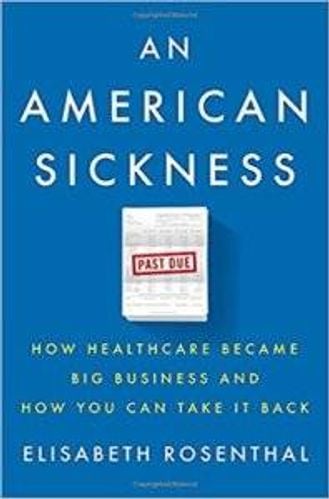How We Can Take Back Health Care From Big Business
Insights from Elisabeth Rosenthal, author of the new book 'An American Sickness'
It’s no secret that America’s health care system is broken, especially when it comes to costs. Doctors, hospitals, insurers and drug companies are entangled in vicious financial and regulatory cycles that spike costs but don’t necessarily deliver better care. Health care is big business and it seems patients are commodities in a high-stakes scheme that often puts profits before people.
How did we get here? Who is to blame? And, how can patients fight back?
Kaiser Health News editor, physician and former New York Times reporter Elisabeth Rosenthal explores these issues in her excellent new book, An American Sickness: How Healthcare Became Big Business and How You Can Take It Back. The idea grew out of Rosenthal’s acclaimed New York Times series, “Paying Till It Hurts,” which introduced readers to a system of players looking to squeeze out the most dollars, leaving patients with incomprehensible and often astronomical bills.
Rosenthal recently talked with Next Avenue about her book. The interview, edited for length and clarity, appears below.

Next Avenue: What did you hope to achieve by writing this book?
Elisabeth Rosenthal: I wanted to help people understand this is not really about medicine or the medical care that your doctor wants. It’s about how financial incentives slowly insinuated themselves into our system while we weren’t looking. The idea was to give people a kind of users’ guide to the system that they can take in any direction they want, and to lay out a menu of options. I’m not going to tell anyone which I prefer, but what we can’t do is sit there and say this will take care of itself. We’ve clearly learned that it won’t.
We’ve been trying to revamp the health care system for decades, and we’re still arguing about how to do it. Why is this so difficult to figure out?
Everyone agrees we have to do something, but we disagree on what that is. So we go endlessly around in circles and end up in a place that’s unsustainable. Families are spending 20 or 30 percent of their household income for health insurance and minor medical care. That’s more than many pay for their mortgage or housing or food, and it can’t continue. If we could manage to spend what other countries do on health care, we’d have a lot more money to spend on the other things we say we care about, like infrastructure.
Many boomers struggle with health costs and feel like the system is rigged against them. What can they do?
I think the boomer generation can be very politically impactful on these issues. There is outrage out there. They’re starting to experience more medical problems, so they’re experiencing the system. I think they’re motivated in a way that the twentysomethings, who don’t interact with the system very much, are not. They feel empowered and entitled to push back on an exorbitant bill or question a charge they don’t understand.
One of those patients in the book is a woman who got a hospital bill for $35,000 that said 'miscellaneous.' She’s a lawyer and said, 'No way. I’m an adult and this is not how I operate. Tell me what this is for.'
I encourage people to open those bills, look at the explanation of benefits, speak out and question these prices.

You talk about holding the drug companies and hospitals accountable for the costs they pass on to consumers. How do we do this?
This is such an important pocketbook issue, and we see it at town halls, we see people rising up to protest. I’d love to see Americans use the voting machine and ask their representatives how they feel about negotiated drug prices. Ask what they’re going to do about provider directories that are so outdated they can’t shop for health care. These are basic consumer rights. If we don’t do it, it’s not clear who will.
Why can’t we seem to bring the skyrocketing price of drugs down?
We’ve heard from both Republicans and Democrats and it’s been played out in Congress and the media, as the price of some life-saving drugs soar out of reach. Both sides have floated the idea of allowing Medicare to negotiate drug prices, as most governments in the rest of the world do, or to allow controlled prescription imports from Canada. Both strategies would bring down prices, but nothing so far has come to fruition. That’s partly because of pressure from industry associations.
I want people to know they do have a say but they have to use it. They have to vote. They have to ask the right questions.
Whose side are health care providers on? Can they do something about cost?
I see this as a partnership between patients and their providers. Everyone in the health care system will need to take on new roles, and hopefully the pressure from the consumer side will mean more responsiveness from the for-profit/provider side.
We need to educate physicians about health pricing and cost and the efficient use of health care. There’s been a disincentive for doing that. That doesn’t mean death panels or withholding care.
People who are well beyond the recommended age for screening still get colonoscopies and mammograms, and we get on this crazy kind of cascade of another test and another. It leads us to a place that’s profitable, but bad medicine. And that’s where we have to be on our guard.
Most doctors are really distressed about this. They feel like they’re cogs in this machine. The system doesn’t encourage them to do the kind of work they want to do. Medical schools need to teach that part of being a responsible physician is thinking about your whole patient, including being a good steward of their financial resources.
Are you optimistic about the future of the American health care system?
I’m not optimistic we’ll wake up tomorrow with 12 percent spending on health-care costs. But I think it’s important to see this ship of cost inflation turned around, eliminating some things that are not necessary and bringing costs under control. We’re at a tipping point where we really do have to do something or those of us looking 20 years into the future are going to face some frightening decisions.
Next Avenue Editors Also Recommend:


